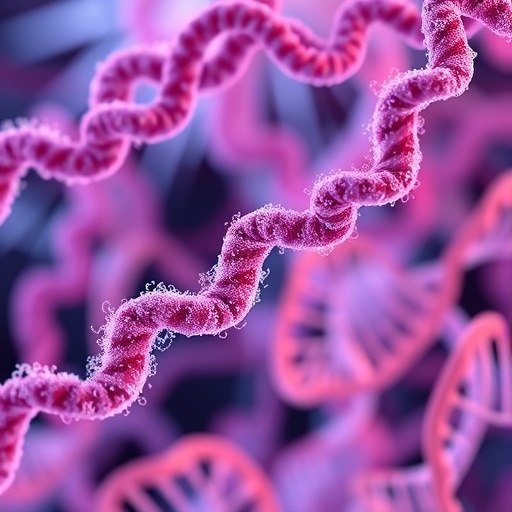A groundbreaking international study has unveiled a promising therapeutic target for cholangiocarcinoma (CCA), an exceptionally aggressive and rare form of liver cancer with limited treatment options. Published in the eminent journal Gut, the research highlights the pivotal role of the protein CNNM4, integral to magnesium transport within cells, and its overexpression in CCA tumors. This revelation sets the stage for innovative, personalized therapeutic strategies that may revolutionize the management of this devastating disease.
Cholangiocarcinoma is notorious for its silent progression and resistance to conventional therapies. Diagnosed frequently at an advanced stage, it poses a substantial clinical challenge with low survival rates and a mere 20–30% of patients eligible for surgery. Given these grim statistics, the search for novel treatment pathways has been an urgent priority within the oncology community. The identification of CNNM4’s involvement in tumor biology not only opens new avenues for targeted intervention but also provides molecular insights into the underlying mechanisms driving tumor aggressiveness and chemoresistance.
At the heart of this study lies the CNNM4 protein, a critical component responsible for mediating magnesium transport into cells. Magnesium, as a vital cofactor in numerous enzymatic reactions and a modulator of cellular metabolism, plays an essential part in maintaining cellular homeostasis. The research team discovered that CNNM4 is consistently overexpressed in CCA cells compared to normal liver tissue, suggesting a metabolic dependency that cancer cells exploit for survival and progression.
The investigators employed advanced molecular biology techniques, including siRNA-mediated gene silencing utilizing GalNAc-conjugated small interfering RNAs specifically designed for efficient liver targeting. This innovative drug delivery method enhances specificity and minimizes off-target effects, heralding a new era of precision medicine tailored for hepatic malignancies. By silencing CNNM4 expression, the team observed significant suppression of tumor growth and an increased vulnerability of cancer cells to chemotherapy.
An intriguing aspect of CNNM4 inhibition revealed by this study is the induction of ferroptosis, an iron-dependent regulated cell death pathway characterized by the accumulation of lethal lipid peroxides. Unlike apoptosis or necrosis, ferroptosis presents a novel therapeutic angle by selectively eradicating malignant cells while sparing normal counterparts, thereby potentially reducing systemic toxicity. The restoration of magnesium balance through CNNM4 blockade was shown to sensitize tumor cells to ferroptotic death, offering a novel metabolic vulnerability that can be exploited therapeutically.
The integrated use of GalNAc siRNA technology ensures that these therapeutic molecules are delivered predominately to hepatocytes and cholangiocytes, maximizing efficacy and safety. This approach addresses one of the principal hurdles in cancer therapy: achieving adequate drug concentration at the tumor site while limiting adverse effects on healthy tissues. The conjugation with N-acetylgalactosamine (GalNAc) exploits receptor-mediated endocytosis by the asialoglycoprotein receptor, which is abundantly expressed in liver cells, ensuring targeted delivery.
Beyond the molecular and pharmacological dimensions, this research underscores the critical interplay between tumor metabolism and microenvironment. By disrupting CNNM4-mediated magnesium transport, cancer cells undergo metabolic reprogramming that hampers their proliferative and invasive capabilities. This metabolic interference appears to weaken chemoresistance mechanisms, potentially enhancing the efficacy of existing treatment regimens and improving patient outcomes.
The study’s lead investigators, Dr. Malu Martínez-Chantar and co–first authors Dr. Naroa Goikoetxea and Dr. María Mercado, emphasize that this discovery bridges cellular metabolism and innovative RNA interference technologies, moving closer to the realization of personalized medicine in oncology. Their collaborative effort, involving multiple international institutions through frameworks like the COST Action CA22125 Precision-BTC Network, highlights how synergistic global research can yield transformative advances for intractable cancers like CCA.
Importantly, the translational potential of these findings extends beyond cholangiocarcinoma. The role of CNNM4 in magnesium homeostasis and ferroptosis could be relevant in other malignancies exhibiting similar metabolic dependencies. This opens prospects for broader applications of CNNM4-targeted therapies and necessitates further exploration into tumor-specific metabolic vulnerabilities.
The successful application of RNA interference techniques, notably the GalNAc-siRNA system, provides a scaffold to develop liver-directed therapeutics with high precision. This addresses a critical limitation of many conventional chemotherapeutic agents, which often lack specificity and cause systemic toxicity. The targeted nature of the delivery system combined with the unique metabolic target enhances treatment safety profiles, reducing adverse effects commonly associated with cancer therapies.
While the clinical translation of these findings will require rigorous testing in clinical trials, the robust preclinical data reinforce the promise of CNNM4 blockade as a novel therapeutic modality. It also encourages the oncology research community to explore metabolic targets in liver cancers further, an area historically underexplored compared with other tumor types.
In summary, the identification of CNNM4 as a metabolic vulnerability in cholangiocarcinoma represents a major stride in understanding and treating this lethal cancer. By leveraging cutting-edge RNA technologies and uncovering a mechanism linked to ferroptosis, the study offers hope for the development of effective, safe, and personalized therapies. This integrative approach blends tumor biology, pharmacological innovation, and metabolic science to forge a path toward improved patient survival and quality of life.
Subject of Research: Cholangiocarcinoma and CNNM4 protein’s role in tumor progression and ferroptosis induction.
Article Title: Role of CNNM4 in the progression of cholangiocarcinoma: implications for ferroptosis and therapeutic potential
News Publication Date: August 2025
Web References:
10.1136/gutjnl-2024-333255
References:
Mercado-Gómez M, Goikoetxea-Usandizaga N, Giné AE, et al. Role of CNNM4 in the progression of cholangiocarcinoma: implications for ferroptosis and therapeutic potential. Gut. DOI: 10.1136/gutjnl-2024-333255.
Keywords: Cholangiocarcinoma, CNNM4, magnesium transport, ferroptosis, RNA interference, GalNAc siRNA, liver cancer, tumor metabolism, personalized therapy, drug delivery
Tags: advanced liver cancer treatment optionscholangiocarcinoma research breakthroughsCNNM4 protein and liver cancerenhancing survival rates in liver cancer patientsinnovative cancer treatment strategiesmagnesium transport in cancer cellsmolecular biology of cholangiocarcinomaovercoming chemoresistance in liver cancerpersonalized medicine in oncologyprotein overexpression in cancerRNA therapy for cholangiocarcinomatargeted therapies for aggressive tumors





